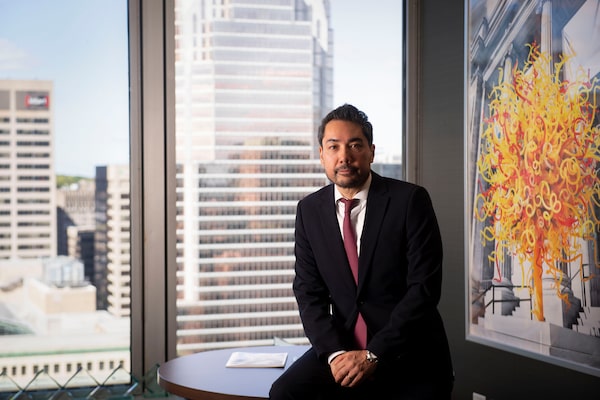
An-Lap Vo-Dignard, senior wealth advisor and portfolio manager, National Bank Financial Wealth Management.Kalen Huxham/The Globe and Mail
Sign up for the Globe Advisor weekly newsletter for professional financial advisors on our sign-up page. Get exclusive investment industry news and insights, the week’s top headlines, and what you and your clients need to know. For more from Globe Advisor, visit our homepage.
In the Behind the Advice series, Globe Advisor asks advisors about their relationship with money from a young age, lessons learned over the years, and how their experiences influence the advice they give clients.
An-Lap Vo-Dignard, senior wealth manager and portfolio manager with Vo-Dignard Provost Wealth Management Group at National Bank Financial Wealth Management in Montreal, talks about saving for his first bike, watching his mother buy and grow businesses, and why he thinks new advisors shouldn’t ask family to be their clients.
What was your first money lesson?
When I was eight, my dad encouraged me to open a bank account. Every time I got money for my birthday, Christmas, or an allowance, I would put it into that account. I remember I wanted to buy a bike, but not just any bike – a BMX bike, which was cool then. Eventually, after many months, I was able to buy it. I learned about delayed gratification, that you can get something you want if you’re patient and save up for it.
What were some of your financial influences growing up?
My parents split up when I was 12 years old. My mom wanted to maintain our lifestyle, so without much cash down, she convinced a wealthy doctor to sell her his duplex in Montreal and finance her with a private loan. She renovated the old duplex, opened a restaurant on the main floor and lived upstairs. The arrangement also meant that my dad could keep the house in nearby Laval, Que., and my younger brother and I would go back and forth between the two homes. The restaurant did very well, but my mother, who also worked as a teacher then, sold the restaurant to avoid burnout. She earned a nice profit on the property. I learned the importance of hard work and how to build something and create value.
How did this impact your career later in life?
After selling the restaurant, my mother bought fixed and sold distressed buildings. One tenant left behind a video store, which my brother and I helped her run. We devised different sales and marketing ideas and learned to budget the business. It gave me a taste of entrepreneurship, influencing my decision to get into finance and eventually run my own financial services company.
What are you good at when it comes to investing?
I’m good at flagging risk. I’m more like my dad in that way. He’s a computer guy who’s more into data and analysis, while my mother is a more gut-instinct investor – although that has worked out well for her. Of course, all investments have some element of risk, but I believe my strength is understanding those risks and deciding whether to proceed. That also includes knowing when to sell an investment that might not work out and when to cut your losses.
What was your biggest money mistake?
Many years ago, I followed the investing strategy of a well-known investor I thought was very good. But I rushed into it without doing enough of my own due diligence. I lost some money. It was my money, not my clients’, but I felt bad. I learned not to focus too much on what others do and to follow my own investing strategies.
What advice do you have for someone looking to get into your industry?
When starting out, don’t go after family and friends as clients. If you start with your uncle and he tells you, ‘no,’ it will hurt. It could also make family gatherings awkward. It’s not as hard to hear ‘no’ from a stranger. You might consider bringing on family and friends later once you’re more established. That’s also when they’ll most likely contact you for help.
This interview has been edited and condensed.
For more from Globe Advisor, visit our homepage.